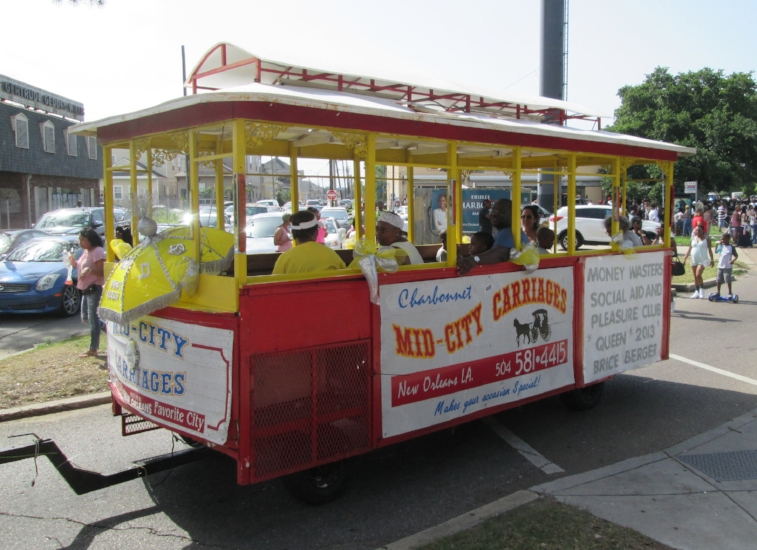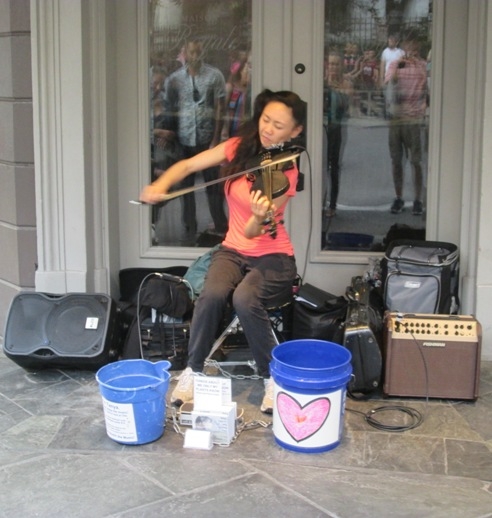“The music grew strange and fantastic—turbulent, insistent, plaintive and soft with entreaty. The shadows grew deeper. The music filled the room. It floated out upon the night, over the housetops, the crescent of the river, losing itself in the silence of the upper air.”
Music has permanently interwoven itself into the fabric of New Orleans. You cannot pass a day without being drawn into the staccato of a trumpet or the tempo of a tap dancer. Street drummers riff the heartbeat of the city; should they ever stop, the entire city would come to a standstill.
Walking past Café Beignet, I heard from inside a guitarist playing the intro to "Dust in the Wind," and I found myself irresistibly drawn to a pause. It's a song I've listened to countless times, but hearing it here in New Orleans resonated with me in a new way. This is a city that has made its peace with transience and constant change and thus has achieved a unique type of immortality. We may all be nothing more than dust in the wind, "just a drop of water in an endless sea," but ephemerality is the one constant of life. Here in New Orleans, the Big Easy, I am learning to accept this impermanence.
Binx, the protagonist of Walker Percy's The Moviegoer, seems to grapple with many of the existential questions of our times—Stasi called him an adult version of Holden Caulfield. While this doesn't always make for the most exciting plotline, Binx's soul-searching is interesting in the context of New Orleans. Often he seeks the experiences, however seemingly insignificant, that are separate from the "abyss" of "ordinary occasions," the moments in which he truly feels and knows that he is alive. To that effect, Binx declares, "The highest moment of a malaisian's life can be that moment when he manages to sin like a proper human (Look at us, [...] we're sinning! We're succeeding! We're human after all!)." Binx's malaise, "the pain of loss," the inability "to be in the world," is like a perversion of New Orleans' easygoing nature. Whereas others see relaxation, Binx sees stagnation, poison, and death. As he grapples with the issues of life and humanity, he finds it impossible to feel any form of typical enjoyment. He needs such moments as a car accident to validate his own existence, to prove that he is alive.
The novel traces the progress of Binx's "search" for meaning; ever the Existentialist, his search in a meaningless world is what supplies meaning. Along these philosophically paradoxical lines, once accepted, life’s meaninglessness gives way to pure life without the burden of meaning. When we simply live, we find true enjoyment. This is something that the people of New Orleans seem to understand tacitly.
In many ways, Binx’s search reminds me of bookpacking, though in a flawed form. He describes the first iteration of his search as a "vertical search," the goal of which is to stand "outside the universe and […] to understand it." Binx does this through reading "only 'fundamental' books, that is, books on key subjects." His reading takes place in the solitude of his room; he reads in isolation "as an Anyone living Anywhere"; location is irrelevant to him, and he ventures outside "only for diversion." When his vertical search is complete, he undertakes a "horizontal search" to understand himself, now that he understands the universe (or so he claims). This second phase of his search inverts the first phase: "Before, I wandered as a diversion. Now I wander seriously and sit and read as a diversion." By the end of The Moviegoer, however, Binx abandons his search, and he gives up his existence to "malaise" and "desire," desire perhaps for an unattainable affirmation of his own humanity.
As bookpackers, we read and wander with the same goal—to understand the world around us and our place in it. We seek to capture the "genie-soul" of New Orleans, its currents and eddies. Unlike Binx, we read and wander at once, and we never presume to fully understand the universe. For us, to understand society and to understand the self, or the individual, are two sides of the same coin (or covers of the same book, if you will). We, too, want to affirm our own humanity, but we do not separate ourselves from the rest of humanity through physical and mental isolation. Rather, we wish to be one with it.
Stasi posing with a band in Jackson Square
Binx’s existential search is reminiscent of Edna, who, in The Awakening, wants to define her own individuality in relation to the men around her. Edna also finds that certain moments can produce feelings of exhilaration and an irrevocable sense of being alive. This often occurs when Mademoiselle Reisz plays the piano. Her music stirs "the very passions themselves […] within [Edna’s] soul, swaying it, lashing it, as the waves daily beat upon her splendid body." Music gives Edna the same sensation of freedom that learning how to swim does; both show her the range and depth of human emotion and capability.
New Orleans is rife with such moments. Music is the immutable feature of this city, the quality that pervades every street, every neighborhood. And I find it all captivating. Bursts of song, a melody caught from the other side of Jackson Square, the guitarist whose song entrances me—these are the moments in which I know I am alive. These are the moments in which I know I am able to "be in the world," to connect with those around me.
Just today, we encountered multiple examples of the magical musicality New Orleans. We spent the first part of our day at a second line parade held by the Money Wasters Social Aid and Pleasure Club. The sheer thrill of being surrounded by a throng of dancers and revelers made me lose awareness of myself—I was a part of this larger group moving as one, almost loud enough to drown out the strain of jazz guiding it.
Later on, we attended a performance at Preservation Hall, a venue in the French Quarter that works to preserve traditional jazz. The Preservation Hall Jazz Band graced us with renditions of "Just a Little While to Stay Here," "You Rascal, You," and "When the Saints Go Marching In." Again, we were more than just passive observers; we were drawn into the experience by the band leader, who invited us to participate in the last two songs. Finally, on our way back to the hotel, we saw a violinist, Tanya Huang, playing "Defying Gravity," one of my favorite songs, on Royal Street. As with the guitarist playing "Dust in the Wind," I stayed until she finished, then grabbed a CD before I left.



Binx never mentions music in his existential search. Maybe this is the element that he is missing, the experience that could connect him to his inner being, the way it does with Edna, or to the outer world, as it does with us. What his search lacks is unity—the "vertical" and "horizontal" components are successive rather than aligned, and he separates himself from society, from "the universe."
For me, music is the great unifier. Music illuminates my emotional landscape like moonlight through an attic window. It excites "the very passions" within me, and it helps me recognize those passions in others. Binx believes that he understands others through psychological tropes that he has learned through watching characters in films, but his understanding is hindered by his failure to comprehend himself first. Of course, I cannot claim full self-knowledge, but music helps me glimpse emotional truths in my own being and in others'.
On a final note, here is a piece of instrumental music composed by Danny Elfman for Rob Marshall’s 2002 film adaptation of Chicago (Alfredo and I forced Chris to watch it a few days ago). The timbre of the song matches the easygoing nature of this bookpacking experience, and I hope you enjoy it.



